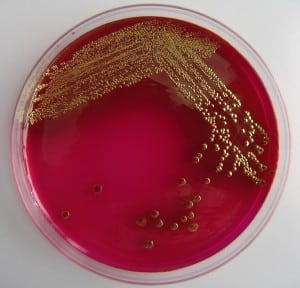E. Coli is a common bacteria found inside people and animals. Most strains are harmless, but certain E. coli strains are harmful and can cause severe illness. You can be infected by swallowing food or water that contains the bacteria.
Contamination happens when food or water comes in contact with stool from humans and animals infected with E. Coli. The foods that are regularly involved with E coli outbreaks include: meat (especially ground beef), sprouts, lettuce, salami, and unpasteurized milk and juice.
Common Symptoms of E. Coli Infection
Symptoms often appear 2-5 days after ingestion of the contaminated food or drink.
- Watery or bloody diarrhea
- Severe abdominal cramps
- Nausea
- Tiredness
- Fever
E. Coli can be diagnosed through a stool sample checked for the presence of the bacteria. More than one stool sample may be needed. The infection generally gets better without treatment in 8-10 days. Antibiotic medications are usually not helpful. Do not take anti-‐diarrhea medication unless prescribed by a doctor. It can make the illness last longer and decrease the body’s ability to get rid of E coli. While you are recovering, drink plenty of fluids to prevent dehydration.
Call Your Doctor if You Have
- No improvement in symptoms after 2 days
- Blood in stool
- Severe Vomiting
- Severe abdominal pain
- Signs of dehydration
Preventing E. Coli Infections
- Cook meats well, especially ground beef, to prevent transmission of E coli.
- Wash your hands with soap and warm water often. Do this before preparing meals, after going to the bathroom, changing diapers or handling pets. Teach your child to do the same.
- Use a food thermometer when cooking. Cook poultry to at least 165°F, pork and ground meats to at least 160°F, beef or lamb to at least 145°F.
- Wash or peel produce before eating.
- Drink only pasteurized milk, juices and ciders.
- Wash cutting boards and utensils with hot soapy water after each use. Clean kitchen counters with bleach or disinfectant.
- Don’t swallow or drink water from pools, lakes, streams or rivers. When camping or traveling outside the country, avoid drinking or cooking with water unless you know it’s safe. If you need to drink or cook with water you are not sure of, boil it for at least 60 seconds before using it.
- If you drink well water, have it tested once a year for germs, including E coli.


